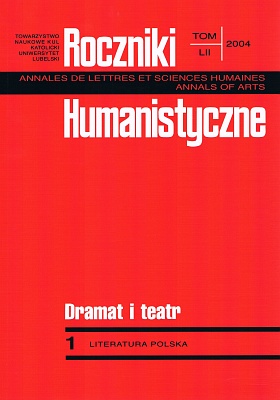Maxwell Anderson jako teoretyk dramatu
Abstrakt
Born in 1888 in Atlantic, Pennsylvania, Maxwell Anderson was among the generation of playwrights who changed the world's perception of American drama. The group of young dramatists included such famous names as Eugene O'Neill, Elmer Rice, Sidney Howard, RobertSherwood, George S. Kaufman, Samuel N. Behrman and Paul Green; however, Anderson was more prolific and versatile than anybody of them. During a career of just thirty years he produced thirty-three plays (about half the number he wrote) which include comedies and tragedies, plays in verse and in prose, satires and musicals. His first play White Desert was written in verse because he was weary of ”plays in prose that never lifted from the ground”. The play failed but Anderson didn't abandon his dream of bringing tragic poetry to the American stage. Examining Aeschylus', Sophocles', Euripides', Shakespeare's and Racine's tragedies, also reading Aristotle's The Poetic, Anderson realized that „in discussing construction Aristotle made a point of the recognition scene as essential to tragedy” and that poetic tragedy had never been successfully written about its own place and time. According to the rules, he composed two very successful historical dramas in verse: Elizabeth the Queen (1930) and Mary of Scotland (1933). However, a few years later, in 1935, Anderson broke his newly discovered principles and composed Winterset, a poetic tragedy based on a true story and set in contemporary New York. Unlike his first contemporary verse drama White Desert, the experiment, Winterset, was a big success and brought him the very first New York Drama Critics Circle Award. His theory and dramas inspired some contemporary theorists as John Mason Brown, John Gassner and Elder Olson; also, the famous American playwright Archibald MacLeish.
Copyright (c) 2004 Roczniki Humanistyczne

Utwór dostępny jest na licencji Creative Commons Uznanie autorstwa – Użycie niekomercyjne – Bez utworów zależnych 4.0 Międzynarodowe.





